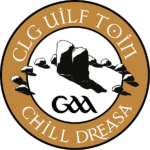Our two 2020 LCC Group Tyrone JFC Final Clubs carry the names of two pivotal figures from Irish history. Both gave their all for and left their mark on this place we call home.
Theobald Wolfe Tone
Theobald Wolfe Tone was born in Dublin on 20 June 1763, qualified in law and in 1791 co-founded the Society of United Irishmen. Committed to an independent Ireland respecting the rights and beliefs of everyone in it, he went to both America and France to develop and pursue his plans, and was part of a 1796 French force whose intended landing in Ireland was foiled by bad weather.
Wolfe Tone was undeterred but was captured in Donegal as part of a second French liberating force in October 1798 and died in The Provost’s Prison, Dublin on 19 November 1798. He is buried at Bodenstown, Co Kildare.
‘To subvert the tyranny of our execrable government, to break the connection with England, the never-failing source of all our political evils, and to assert the independence of my country—these were my objects. To unite the whole people of Ireland, to abolish the memory of all past dissentions, and to substitute the common name of Irishman in the place of the denominations of Protestant, Catholic and Dissenter—these were my means.’
GAA Clubs in Drumquin here in Tyrone, Antrim, Armagh, Clare, Cork, Derry, Longford, Louth, Meath, Australia, Canada, England and the USA also honour the name of this man who gave his all for others.
Patrick Sarsfield
Patrick Sarsfield lived a century earlier than Wolfe Tone, being born at Lucan near Dublin, about 1650. His mother was a ‘Laois O’Moore’ (the family whose name is carried on by O’Moore Park, Portlaoise) whilst his father was of landed Anglo-Norman stock.
Sarsfield was a successful officer in the English army and led for King James II in the 1685 Battle of Sedgemoor that ended the Duke of Monmouth’s rebellion. He went on to be prominent on the Irish side in Ireland’s Williamite Wars of the 1680s/1690s, particularly in/around Limerick. One of Irish history’s great ‘What ifs’ comes from the refusal of his commander, St Ruth, to make full use of Sarsfield’s military cleverness at the decisive Battle of Aughrim in 1691.
After the Treaty of Limerick Sarsfield left Ireland as a leader of the ‘Wild Geese’ and joined France’s Irish Brigade. Mortally wounded at Landen in 1693, after looking at the blood on his hand his last words were: “That this were for Ireland.”
Patrick Sarsfield is well-remembered across the GAA with Clubs named for him in Antrim, Armagh (the ‘High Moss’ Sarsfields our own legendary Kieran McGurk played for), Cork, Derry, Dublin, Galway, Kildare, Laois, Longford, Mayo, Monaghan, Tipperary and Wexford as well as, of course, Drumragh here in Tyrone.



